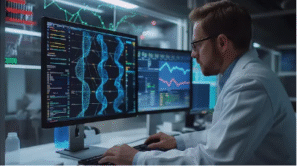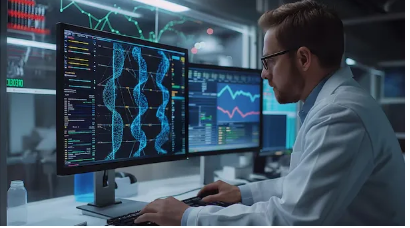Replace medical coding with artificial intelligence? Differentiating Hyperbole from Reality
Replace medical coding with artificial intelligence? Differentiating Hyperbole from Reality .Healthcare is not an exception as artificial intelligence (AI) keeps changing sectors all around the world. Among the several jobs possibly influenced by artificial intelligence, medical coding is one that is often under discussion.
Given the fast advances in automation, one important issue becomes: will artificial intelligence replace medical coding? This paper explores that issue by juggling clinical complexity’s reality with technological optimism.

Knowing Medical Code
Medical coding is the conversion of healthcare diagnosis, treatments, and procedures into universal alphanumeric codes. Billing, insurance claims, data analysis, and guaranteeing adherence to healthcare laws all depend on these codes.
Coders have to know not only medical jargon but also payer rules and healthcare laws. Accuracy is non-negotiable; mistakes could cause compromised patient treatment, denied claims, or legal consequences.
AI’s Current Function in Healthcare
From analysing diagnostic pictures to projecting patient readmissions, artificial intelligence has made astounding advances into many facets of healthcare. Administrative applications of tools such Natural Language Processing (NLP) and Machine Learning (ML) are being used for coding and clinical documentation.
For example, NLP helps Computer-Assisted Coding (CAC) systems suggest medical codes and extract pertinent information from clinical notes. Many health systems now use these instruments to improve efficiency, hence they are not only hypothetical.
The brief response would be Not yet, nor completely.
AI struggles with numerous important issues even if it might speed up the coding process and ease clerical burden. Contextual understanding: AI might miss subtleties a human coder might find or misinterpret vague clinical notes. Managing exceptions—complex instances involving several disorders, rare diseases, or unexpected operations—often calls for human judgement.
Regulatory interpretation Many times, coding relies on payer-specific rules or complex regulations AI could not be able to manage without revised rule sets. Consequently, present artificial intelligence systems are more of augmentative aids than replacements.
Human plus artificial intelligence: The direction of medical coding
Cooperation seems to hold the most bright future. While human coders concentrate on quality control, compliance, and exception handling, artificial intelligence may undertake repetitious chores and recommend basic codes.
Health systems utilising AI-assisted coding, for instance, have claimed shorter turnaround times and less backlog; however, they depend on coders for audits and validation. This synergy lets programmers advance from task-based jobs to more strategic, monitoring duties.
Future Skills: Areas of Interest for Coders
Medical coders’ skill set has to change as artificial intelligence develops. Important areas of development comprise. Technology literacy is the knowledge of how AI technologies operate and how one could properly engage with them.
Data analytics Capacity to discover abnormalities, understand coding trends, and support projects aimed at data quality. Comprehensive knowledge of compliance systems, payer policies, and clinical guidelines qualifies one as regulatory expert. Simply said, those who can link technical expertise with clinical knowledge will always be invaluable.
Legal and ethical concerns
Including artificial intelligence into medical coding also begs serious concerns about:AI systems depend on vast amounts of patient data, so strict cybersecurity and HIPAA compliance become even more important. Should an artificial intelligence miscode a record, who bears liability—that of the coding team, the software vendor, or the healthcare provider? Governments and accreditation agencies have to change their systems to control artificial intelligence application in healthcare coding.
These elements imply that even if artificial intelligence might manage some aspects of coding, human experts still bear responsibility and ethical protection. Will this artificial intelligence replace medical coding? The research suggests a more complex response: artificial intelligence is a potent assistant rather than a substitute.
Like many technical changes, those that adjust will flourish. Medical coders who embrace artificial intelligence, pick up new skills, and concentrate on value-added duties not only remain relevant but also become even more important to the direction of healthcare. Medical coders should see artificial intelligence as a chance to advance their profession—into roles of oversight, insight, and leadership in a data-driven healthcare system—instead of worrying about obsolescence.
